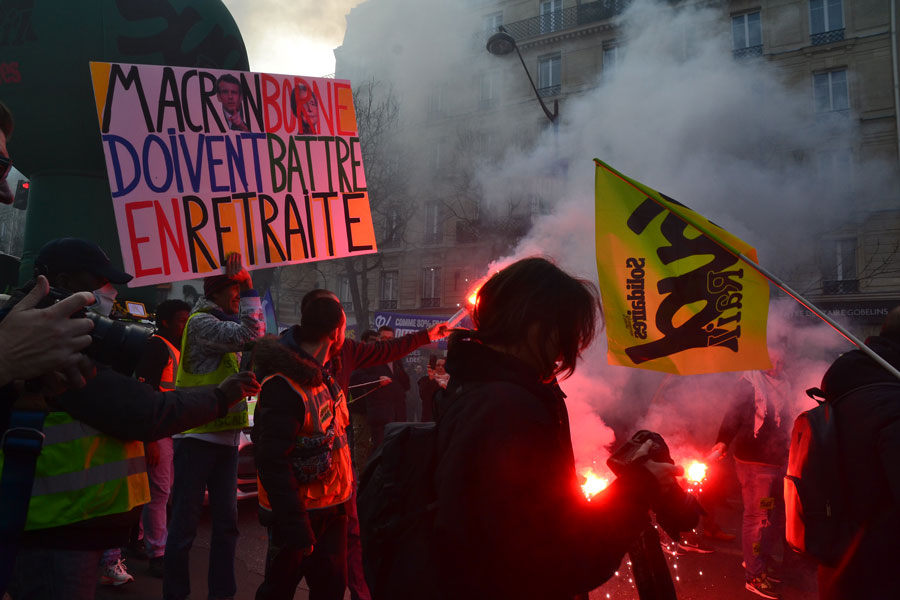
Trains and public transport affected
At the national level, rail traffic is disrupted, with three out of five TGVs and one out of two TERs on average, according to SNCF.
In Paris, a thousand demonstrators invaded the tracks of the Gare de Lyon before noon, disrupting traffic a little more.
The RATP has reduced traffic on most metro lines while keeping them open when the RERs are very disrupted with 40% reduction on lines A and B.
In Rennes, demonstrators on the SNCF tracks stopped traffic on the Rennes / Saint-Brieuc line, according to the prefecture. The city's bus network is also affected by the blocking of its main depot, according to its manager.
In Lorient, demonstrators are present on the tracks of the station, where pallets and garbage cans are burning, according to AFP.
Missing fuels
Tuesday at 8:30 a.m., 15,52% of service stations in France are in shortage of at least one fuel (petrol and / or diesel) that they offered on Wednesday March 1, according to public data analyzed by AFP . 6,89% of the stations are dry.
The most affected department is now Mayenne (50% of stations in shortage of at least one fuel). The West remains particularly affected: in Loire-Atlantique (43%), in Île-et-Vilaine (45%), in Maine-et-Loire (nearly 40%).
The southern departments are still among the most affected, in particular Haute-Garonne (41%) and Bouches-du-Rhône (39%).
Finally, shortages are beginning to reach Ile-de-France, in particular Val-de-Marne (44%), Essonne (37%) and Yvelines (34%).
These shortages result from the disturbed situation in the refineries.
At TotalEnergies, that of Normandy is at a standstill. The employees voted to renew the strike until Thursday 13 p.m., according to a CGT delegate.
At the Donges refinery (Loire-Atlantique), shipments are interrupted, according to management. Ditto at the La Mede biorefinery (Bouches-du-Rhône), where shipments remain blocked. The Feyzin refinery (Rhône) is operating at reduced flow, according to management.
At Esso-ExxonMobil, the shutdown of the Port-Jérôme-Gravenchon refinery (Seine-Maritime) continues, and shipments are still blocked Tuesday morning, according to management. Regarding the Fos-sur-Mer refinery, it continues to operate in an "adjusted" manner, shipments having made it possible to avoid a production stoppage due to full tanks.
The PetroIneos refinery in Lavéra (Bouches-du-Rhône) is still shut down and its shipments blocked, according to the CGT.
Drop in electricity production
The management of EDF reports production cuts made by the strikers on Tuesday morning, of the order of 8.030 MW, or the equivalent of eight nuclear reactors (out of the 56 in the country).
Roads blocked, slowed down
In Rennes, traffic on the ring road was disrupted by around 400 people from 7:00 am, causing a 45 km traffic jam. The situation returned to normal around 11 a.m., according to the prefecture.
In Nantes, traffic was also extremely disrupted due to protest actions on the ring road, according to Bison Futé.
In Caen, the ring road was cut in both directions by demonstrators.
Near Chalons-sur-Saône, a filter dam caused traffic jams, according to the police.
Hindered Logistics Center
In the north of Lille, a hundred demonstrators occupy two large roundabouts serving the regional transport center (CRT) of Lesquin, a major logistics center, causing disruptions even on the A1 linking Paris to Lille, and the A23 in the direction of Valenciennes, indicated Rémy Quéant, secretary general FO Transport Lille.
Air transport
The airports of Montpellier and Quimper saw their traffic interrupted Tuesday morning due to the strike of air traffic controllers, according to the General Directorate of Civil Aviation (DGAC). Montpellier-Méditerranée reopened at 9 a.m., while Quimper-Pluguffan will remain closed until 00 p.m., causing delays.
The administration had asked the airlines to cancel preventively Tuesday and Wednesday 20% of their flights at Paris-Orly, Marseille, Toulouse and Bordeaux.
She reiterated her request for around 20% of flights on Thursday (from Orly, Marseille, Toulouse) and Friday (from Orly, Lyon, Marseille, Toulouse).
Beyond airports, work stoppages by air traffic controllers affect en-route air navigation centers (CRNA, management of aircraft transiting through French airspace), with repercussions on all European traffic.
On Tuesday morning, aircraft using the areas managed by the CRNAs of Marseille and Reims are subject to delays that can be "high", i.e. more than 45 minutes, according to the pan-European air traffic monitoring body Eurocontrol.
Waste
In Paris, 7.300 tons of garbage cans still litter the streets, according to the town hall on Monday evening.
In Marseille, even if the garbage collectors are still not officially on strike, the waste is piling up in several districts, in particular those affluent of Prado or Boulevard Périer.
In Le Havre, around 50 people continued on Tuesday to block the center dedicated to water purification and waste management, preventing employees from taking up their posts or taking out garbage trucks.
Teachers, high school students and students
According to the Ministry of Education, 8,37% of teachers on strike including 7,60% in primary and 9,13% in secondary (middle and high schools). The Snuipp-FSU, the leading union in nursery and elementary schools, estimated on Monday that 30% of primary school teachers would be on strike on Tuesday.
The ministry reports 53 incidents in France in front of schools, including 14 blockages, 27 filter blockages, seven attempted blockages and five other forms of disruption.
In Paris, blockages, often filtering, were installed in front of several high schools, including Montaigne (XNUMXth arrondissement), Lavoisier (XNUMXth), Monet (XNUMXth) or Turgot (XNUMXrd). And in its suburbs, two colleges in Montreuil were affected.
In Le Havre, the Claude Monet high school is blocked by high school students, as is the Jeanne d'Arc high school in Rouen, according to the Seine-Maritime prefecture.
In Lille, the scientific campus is closed "as a security measure", according to the administration, "blocked" according to the Student Union Federation and South. Sciences Po Lille was closed on Tuesday.
In Lyon, the site of the Manufacture de Lyon 3 was blocked for the first time since the beginning of the movement.
In the South-East, the Faculty of Letters in Nice is blocked, according to the prefecture of the Alpes-Maritimes.
According to the Aix-Marseille rectorate, the Mistral high school in Avignon as well as the Thiers and Montgrand high schools in Marseille are blocked.
In front of the Thiers high school, the most popular in Marseille, garbage containers blocked the various entrances. Only Terminales students taking baccalaureate exams or students from preparatory classes could enter.
Member of Parliament targeted
In Lille, the home of Renaissance MP Violette Spillebout, former chief of staff of PS mayor Martine Aubry, was briefly walled up, before the police intervened, by a dozen demonstrators FSU, Sud, NPA and the citizen collective the Offensive. Ms. Aubry described this operation as "unacceptable".
Pensions: back on the streets, the unions are calling in vain for "mediation"
Opponents of the pension reform were fewer in the street on Tuesday, for a tenth day of action at the call of the unions who demanded a "mediation" rejected by the government but supported by its Modem allies.
Five days after a burst tarnished by numerous overflows, the mobilization seemed to be marking time. The first figures from the authorities and the unions attested to a declining participation, as in Tarbes (5.000 to 15.000), Nice (3.700 to 25.000) or Clermont-Ferrand (11.000 to 40.000).
"The movement is not running out of steam", however affirmed from the Auvergne city the leader of the CGT, Philippe Martinez, judging "the determination always as important" to demand the withdrawal of the reform and its flagship measure: the postponement of the legal age of 62 to 64.
While the violence during the demonstrations last week, then around the basin of Saint-Soline (Deux-Sèvres) during the weekend, is still in everyone's mind, the number one of the CFDT, Laurent Berger, proposed Tuesday on France Inter "a way out" through "mediation" to find "a social compromise".
Solution immediately dismissed by the government: "We do not necessarily need mediation to talk to each other," said his spokesperson, Olivier Véran.
An "unbearable" response for Mr. Berger, who replied from the head of the Parisian procession: "It will start to be enough, the ends of not receiving".
The first trade unionist in France, however, received the unexpected support of MoDem deputies, members of the presidential majority. "It's good to have one or two people to try to find the dialogue and have some perspective," said their leader Jean-Paul Mattei.
"Coming Out on Top"
The situation remains deadlocked for the time being, pending the decision of the Constitutional Council, which must rule on the bill within three weeks.
"If the government wants to come out on top, it must suspend the reform. The longer it waits, the more complicated it will be," said the general secretary of Force Ouvrière, Frédéric Souillot, promising in unison with other union officials the continuation of strikes and mobilizations.
On the ground, opposition to the reform remains strong. Morning roadblocks were reported in Rennes, Caen and Lille, among others. Train traffic is also disrupted, with three out of five TGVs and one out of two TERs on average, according to the SNCF. The Eiffel Tower was also closed.
In Paris, demonstrators invaded the tracks of the Gare de Lyon at the end of the morning, causing delays. Same scene in Lorient, with the key to the interruption of traffic between Auray and Quimper.
The situation was not improving on the fuel front, with still more than 15% of service stations running out of petrol or diesel. Shortages ever more marked in the West and the South, and which also extended to Ile-de-France.
On the other hand, teachers were less mobilized, with only 8% of teachers on strike according to the Ministry of National Education.
"Appeasement" versus "rotting"
The authorities rather scrutinize the agitation of the youth, whose information predicted "a much larger presence" in the processions. Dozens of blockades of universities, high schools and even colleges have been identified, from Avignon to Le Havre, from Lille to Bordeaux.
The police expect a total of 650.000 to 900.000 demonstrators in nearly 200 cities, including 70.000 to 100.000 in Paris.
Fearing "very significant risks of disturbing public order", Interior Minister Gérald Darmanin has planned an "unprecedented security system": 13.000 police and gendarmes, including 5.500 in the capital, where "more than 1.000 elements radicals" are expected.
After the clashes during the last demonstrations, then the clashes in Sainte-Soline, many are worried about the ambient "chaos".
At the Elysee Palace, where Emmanuel Macron received the executives of the majority and the government on Monday, the head of state nevertheless said he wanted to "continue to reach out to the union forces" on other subjects, according to a participant.
The Prime Minister, Elisabeth Borne, insists on her desire to "put appeasement".
But the left, through the voice of several of its tenors, including the leader of the PCF Fabien Roussel, on the contrary accused Tuesday Emmanuel Macron of "playing the rot" of the social movement.
 Attal leans towards a tightening of the condition of affiliation to unemployment insurance
Attal leans towards a tightening of the condition of affiliation to unemployment insurance
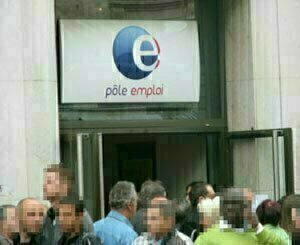 What future for unemployment insurance?
What future for unemployment insurance?
 Negotiations on Cetu extended to professional retraining
Negotiations on Cetu extended to professional retraining
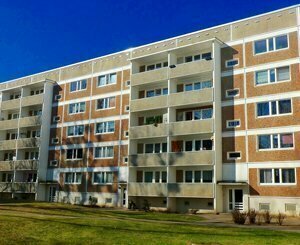 Evicting too-rich tenants from social housing, a controversial idea
Evicting too-rich tenants from social housing, a controversial idea
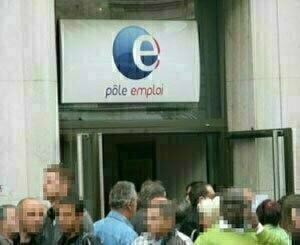 Unemployment insurance: the failure of negotiations on senior employment increases uncertainty
Unemployment insurance: the failure of negotiations on senior employment increases uncertainty
 Failure of negotiations on the employment of seniors, the unemployment insurance agreement compromised
Failure of negotiations on the employment of seniors, the unemployment insurance agreement compromised
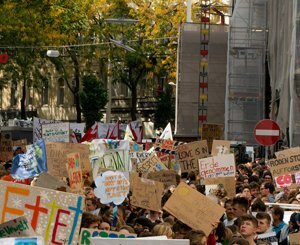 Intrusion at Lafarge: 200 people demonstrate in support of the 17 held in police custody
Intrusion at Lafarge: 200 people demonstrate in support of the 17 held in police custody
 A bill to limit the right to strike in transport examined in the Senate
A bill to limit the right to strike in transport examined in the Senate
 The mortgage rate fell in February, for the first time in 1 years
The mortgage rate fell in February, for the first time in 1 years
 Building and real estate: a sector plagued by crises but whose ecological transition is underway
Building and real estate: a sector plagued by crises but whose ecological transition is underway
 As the world burns more fossil fuels than ever, persistent obstacles hamper the race for renewable energy
As the world burns more fossil fuels than ever, persistent obstacles hamper the race for renewable energy
 The National Housing Agency announces a national France Rénov' tour with an official launch in Chartres on April 19, 2024
The National Housing Agency announces a national France Rénov' tour with an official launch in Chartres on April 19, 2024










